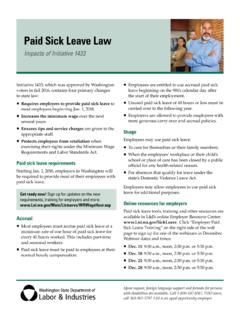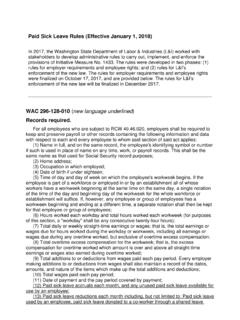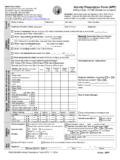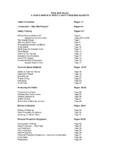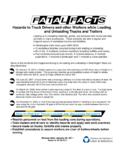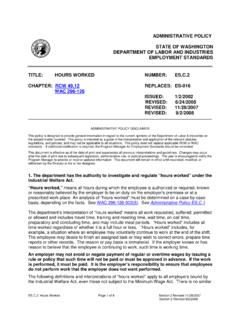Transcription of F700-032-000 Washington State Prevailing Wage Law Book
1 Prevailing wage ProgramUnderstand your responsibilities and rights when performing public work. October 2014 Edition The Washington State Prevailing wage LawN O T I C EThis document contains sections of the Revised Code of Washington (laws) and the Washington Administrative Code (WAC rules) that are current as of the date shown on the front cover. Changes to laws and/or rules may occur in legislative sessions or departmental rule activities. Please research the most current language of the laws, which is available at You may also contact the Prevailing wage Program to obtain the most current laws. Contact information is available at the back of this photo courtesy of Reader: The Prevailing Wages on Public Works Act (Chapter RCW) requires that employees of government contractors be paid Prevailing wages for all public work.
2 Agencies awarding public work contracts include State agencies, counties, municipalities and all political subdivisions of the ask that you help us better serve workers, contractors and public agencies and comply with these booklet will help you better understand the law and applicable rules. Section 1, the Plain Language Description, explains your rights, duties and responsibilities. However, Section 1 is not a substitute for reading the laws (Section 2) and rules (Section 3).All public agencies, contractors performing public work, and construction workers on public works construction should be aware of their rights and legal responsibilities. Failing to comply with the provisions of Chapter RCW may subject contractors and/or public agencies to liability for all unpaid Prevailing wages and Department of Labor & Industries (L&I) administers the Prevailing wage law.
3 The Office of the Attorney General provides legal counsel to L&I and prosecutes violators. The State Auditor s Office ascertains if a public agency s policies, procedures and practices meet the requirements of the you have questions that this booklet does not answer, please contact us for assistance. You will find telephone numbers, websites and email addresses at the back of this ChristensenProgram Manager/Industrial StatisticianContentsPlain Language Description ..1 1. Introduction ..2 2. The Prevailing Wages on Public Works Act ..2 3. Public Work and Work Requiring the Payment of Prevailing Wages ..3 4. Prevailing wage ..4 5. Intents and Affidavits ..5 6. Rights of Workers ..7 7. Responsibilities of Awarding Agencies ..8 8. Responsibilities of Contractors and Subcontractors ..10 9. Bids and Contracts ..13 10. Payment of Reduced wage Rates.
4 14 11. Retainage ..15 Selected Laws ..17 Selected Rules ..41 Contact Information ..69 Contractor/Employer Rights information is available at Language Description21. IntroductionA. How to Use this Booklet: The Plain Language Description chapter of this booklet is provided to help you understand the laws and regulations regarding Prevailing wages. A brief explanation is provided here to ease your research into the laws and WAC rules. At the end of each section, the applicable Revised Code of Washington (RCW) and Washington Administrative Code (WAC) references are given so you can directly locate, read and understand the laws and regulations. Together, these references should help you understand your rights and responsibilities. Telephone numbers for contacting the Department of Labor & Industries (L&I) are provided at the back of this booklet, in case you have further questions.
5 You may also email the L&I Prevailing wage Program at to request further How NOT to Use this Booklet: Do not rely on this plain language description without reading the laws and regulations. This booklet is not legal advice and is not a substitute for the laws and regulations of the State . The informal discussions below are meant to be helpful when read in conjunction with the laws and WAC rules. They are not meant to be a substitute for reading and understanding the laws. After reading the laws and regulations, please do not hesitate to contact the Prevailing wage Program with any questions you may The Prevailing Wages on Public Works ActA. The Law: Enacted in 1945, the Washington State Public Works Act (Act), also known as the Prevailing wage law, is a worker protection act. It requires that workers be paid Prevailing wages when employed on public works projects, on public building service maintenance contracts, and on certain work involving public contracts to rent, lease or purchase private , RCW , RCW , RCW , RCW and WAC Purpose: The Public Works Act is partly modeled after the federal Davis-Bacon Act, which was enacted to protect the employees of contractors performing public works construction from substandard earnings, and to preserve local wage standards.
6 The employees, not contractors or employers, are the beneficiaries of the Act. The Act is remedial and should be liberally construed. In other words, L&I is directed to apply the law in ways that carry out the law s intent which is to protect workers and preserve local wage standards. C. Application: The Public Works Act regulates wages paid to workers, laborers, and mechanics performing public work. It does not apply to work that is clerical, executive or administrative in nature. For example, the Act does not apply to the work of a secretary, engineer or administrator, unless 3such person is performing construction work, alteration work, repair work, etc. Prevailing wage application depends on the nature of the work that is performed, regardless of the worker s job title. Any doubts or questions regarding the applicability of the Prevailing wage law should be directed to the Prevailing wage Program.
7 RCW and RCW Public Work and Work Requiring Payment of Prevailing WagesA. Defined: Public work means work, construction, alteration, repair or improvement that is performed at a cost to the State or any other public agency. This includes, but is not limited to, construction, reconstruction, maintenance, replacement or repair such as demolition, remodeling, renovation, road construction, building construction, ferry construction and utilities construction. RCW , RCW and WAC 296-127-010B. Public Building Service Maintenance Contracts: Prevailing wages are also required on all public building service maintenance (janitorial) and WAC 296-127-023C. Offsite Prefabrication: The offsite fabrication of non-standard items specifically produced for a public works project is considered public work for which Prevailing wages are required.
8 Examples include, but are not limited to: fabrication of ducts for heating, ventilation, and air conditioning systems, certain concrete tunnel liners, and certain steel prefabrication. If you have any questions about whether Prevailing wages apply to an item fabricated for a public work offsite, contact L&I for a determination which will be based on all relevant factors, including (1) whether the item is fabricated in an assembly/fabrication plant set up for, and dedicated primarily to, the public works project; (2) whether the item requires assembly, cutting, modification or other fabrication by the supplier; (3) whether the item is typically an inventory item which could reasonably be sold on the general market; and (4) whether the item, although generally defined as standard, has unusual characteristics such as shape, type of material, strength requirements, or finish, etc.
9 , specifically for the public works and WAC 296-127-010(5)(b)D. Maintenance: Prevailing wages are also required to be paid to laborers, workers or mechanics who perform maintenance by , RCW , RCW , WAC 296-127-010 and WAC 296-127-023E. Material Suppliers: The production and delivery of sand, gravel, crushed rock, concrete, asphalt and other similar materials may require the payment 4of Prevailing wage rates when that work is executed under a public works contract depending on the specific nature of the work performed and its relationship to the project. Contact L&I for a specific , RCW , RCW and WAC 296-127-018 F. Turnkey Projects (lessee/lessor relationships between public and private parties): Prevailing wages must be paid for any work, construction, alteration, repair or improvement that the State or a municipality causes to be performed by a private party through a contract to rent, lease, or purchase at least 50 percent of the project by one or more State agencies or and WAC 296-127-010(7)(a)(iii)4.
10 Prevailing WageA. Defined: Prevailing wage is the hourly wage , usual benefits and overtime, paid in the largest city in each county, to the majority of workers, laborers, and mechanics performing the same work. Prevailing wages are established by L&I for each trade and occupation employed in the performance of public work. The Prevailing rate of wage is established separately for each county, and reflects local wage and RCW Same Trade or Occupation: Classifications or scopes of work are adopted as Prevailing wage rules in chapter 296-127 WAC. To ensure payment of the correct wage rate, the work must be paid at the trade or occupation rate that applies to the type of work performed. Misclassification into a lower paid classification is a failure to pay the Prevailing rate of wage . The Industrial Statistician determines wages and scopes of work.
